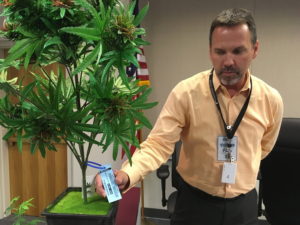Oregon races to finalize rules for marijuana, issue licenses

PORTLAND — After months of public hearings with pot growers, lawmen, public health officials and others, an Oregon commission is racing to finalize recreational marijuana regulations and issue licenses to hundreds of businesses within a few months.
But those who aim to produce souped-up coffee and other niche products might have to wait a bit longer.
“It’s like the circus around here,” Oregon Liquor Control Commission Chair Rob Patridge said after a hearing where a pot advocate and panel member argued whether marijuana is safer than alcohol, and an entrepreneur discussed marijuana-infused java.
The commission has been grappling with its massive task, issues that Colorado and Washington state previously dealt with, including the number of licenses initially offered. Alaska also legalized pot in 2014.
Oregon decided to do some things differently, including:
• Setting a lower tax rate than Washington’s 37 percent and Colorado’s rate of upward of 29 percent. A pot advocate who helped write Oregon’s legalization measure said this allows for the regulated businesses to effectively compete with the illegal market by not driving their prices too high.
• Avoiding caps on the number of licenses, so “we can let capitalism work it out, like we do with bars and breweries with no cap,” Anthony Johnson said.
The OLCC has had to deal with changes mandated by the legislature and requests from numerous interests as it establishes the regulations.
“We’re trying to accommodate everybody, but you’ve got to realize that people are throwing a new business model at us every day … like coffee, like ice cream, like yogurt, like marijuana tasting bars,” Patridge said. At some point, “we have to stop, get the rules in place” and then assess it again.
Patridge is an unlikely champion of making marijuana go mainstream, a trade whose outlaw status used to evoke images of marijuana-laden burros being led down the Sierra Madres and of pilots contour-flying across borders to avoid radar.
A district attorney from a conservative southern Oregon county, Patridge voted against legal pot, and is still against it.
“I’m not going to stand on the air hose of what Oregonians wish to do,” he said. “My side lost, and so now we’re going to put in the best system that we can put in, to allow these marijuana entrepreneurs to move forward, and allow the public the access that they voted for.”
Johnson, a lawyer working full-time on marijuana political reform, was at first wary of Patridge, but the two have formed a bond. Patridge keeps Johnson’s mobile number on his own cell phone and calls him “the Godfather of Measure 91.”
“I will admit that I had some misgivings that a Republican district attorney was going to be a good steward for the marijuana industry,” Johnson said. “But I have been very surprised and pleased with how Rob has handled the job.”
Business people have been coming from around the country — lawmakers recently tossed out a residents-only requirement — to try to get a piece of Oregon’s cannabis industry that already existed for 18 years with medical marijuana.
The commission said it wants at least part of the supply chain ready by year’s end. When complete, it will cover production from seed to store and will allow the tracking of the marijuana with a computer dashboard using data from radio frequency identification scanners and tags.
“Each plant has a serial number, just like a VIN number on a car,” said Scott Denholm, executive director of Metrc, which has partnered with the commission to build the tracking system.
The commission issued its first recreational marijuana licenses on May 2 to eight businesses, including one called Far Out Farms. It is dealing with more than 1,500 license applications as of Wednesday, and approved about 50 others.
Each applicant must undergo a criminal background check and receive land use approval from local authorities. The commission’s staff was increased by about 44 staff to around 260 to handle the extra work, Patridge said.
Steve Marks, the commission’s executive director, said he spends 70 percent of his time on marijuana issues, which is turning out to be a big business.
Medical marijuana dispensaries, which can sell recreational marijuana until Dec. 31, started collecting a 25 percent tax on those sales in January.
Recreational outlets will charge a 17 percent tax. The state says it processed a whopping $10.5 million in marijuana tax payments through April 29.
The Legislative Revenue Office in May quadrupled its estimate of net tax revenues, from $8.4 million to $35 million, that the state is expected to receive from recreational marijuana through June 30, 2017, according to Malik Mazen, senior economist with the Legislature.
A company named Avitas, which is awaiting a license, began refitting a former cabinet factory in March located less than a mile from the state Capitol in Salem into a 12,000 square foot “cannabis production facility” and expects to be done by mid-June.
The facility is expected to produce 160 pounds of marijuana per month, plus a powerful cannabis oil produced with compressed carbon dioxide.
Avitas General Manager Joe Bergen predicted that the industry will have an enormous effect on the economy, and predicted other states will legalize.
“We believe that the Pacific Northwest will be the epicenter for high quality cannabis because of the climate and culture here, much like the craft brewery movement,” he said.
